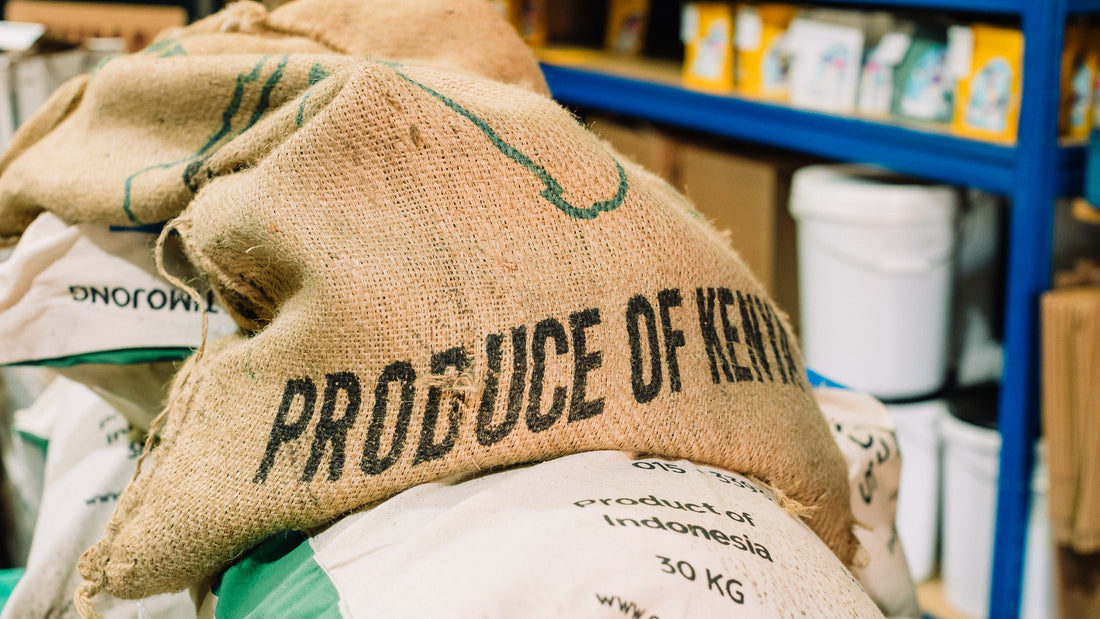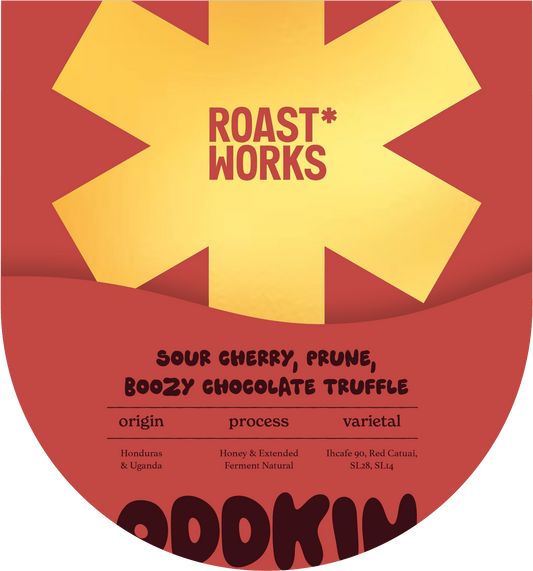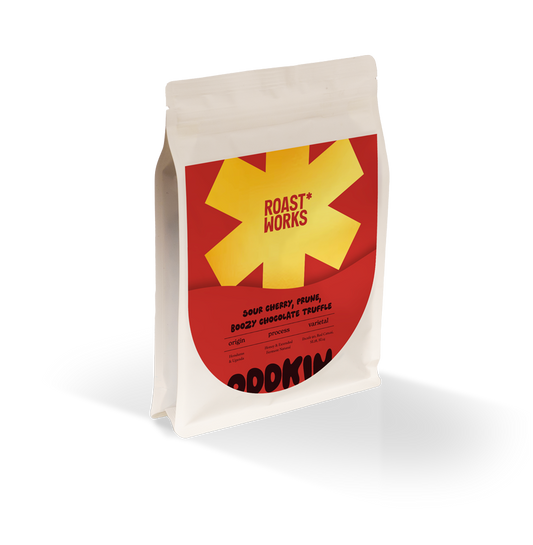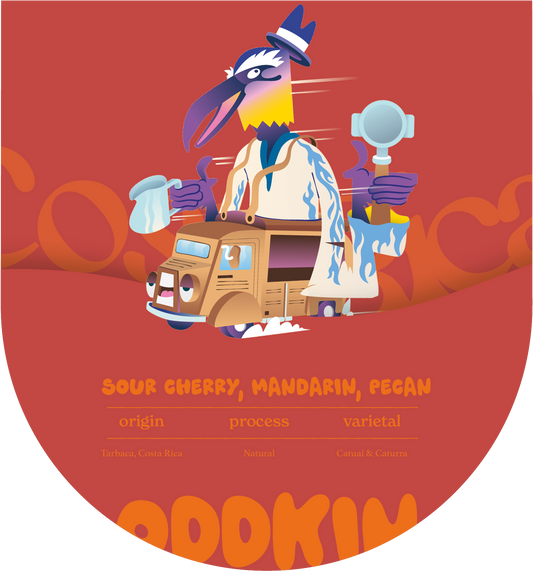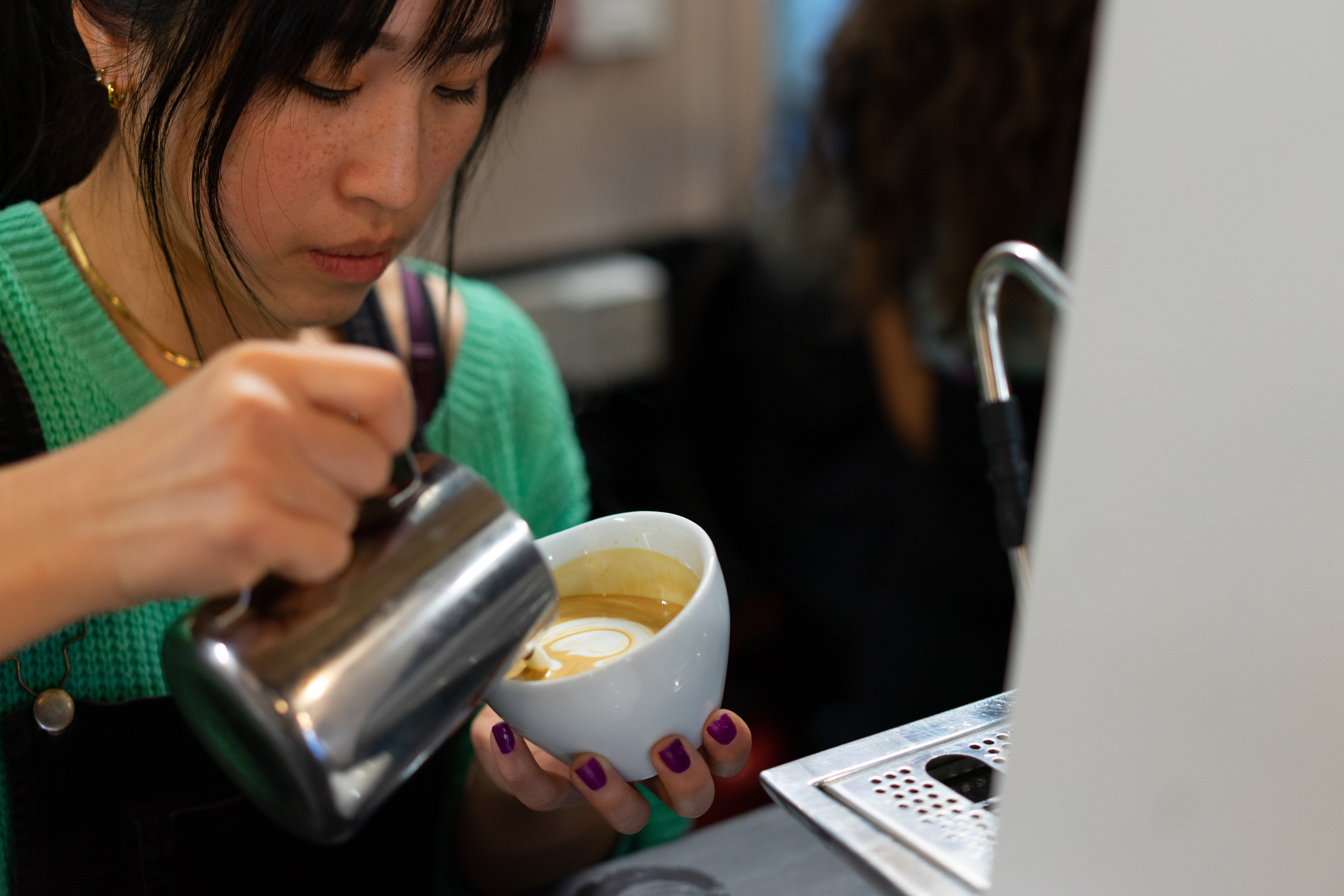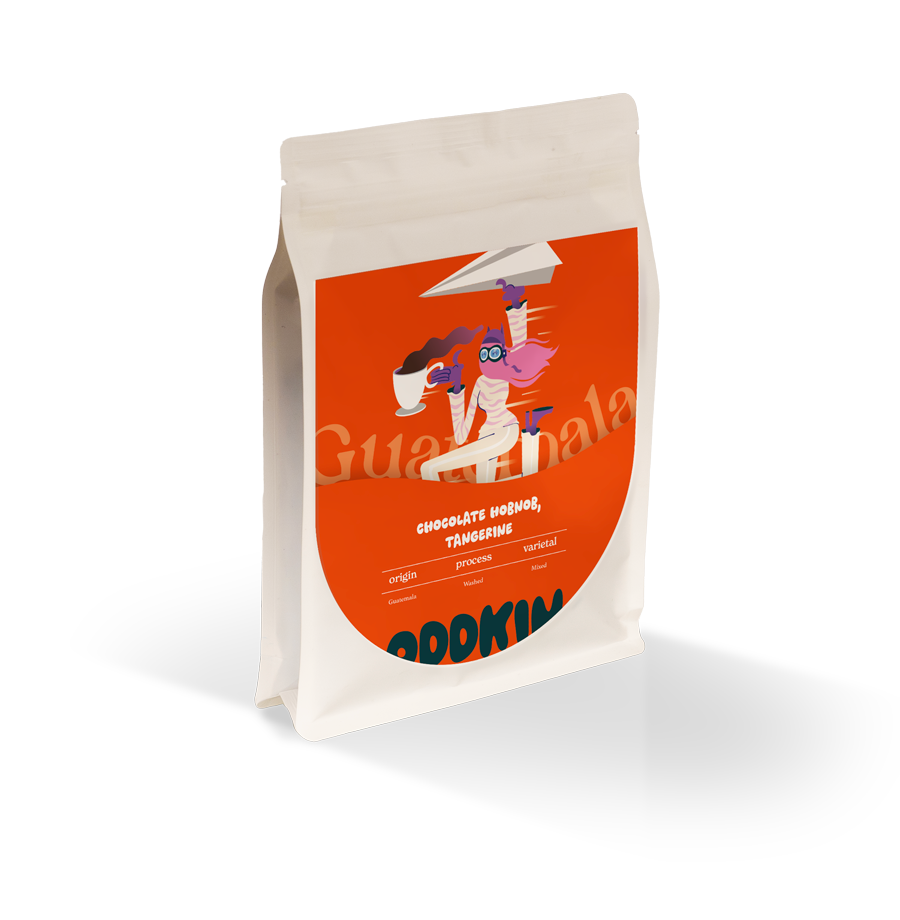Kenyan coffee origin guide
You might have recently taken a sip of our Kenya Nabiswa and thought to yourself - I need to know more!
Or maybe, you’re a keen coffee enthusiast who wants to learn about different coffee origins around the world.
Whatever it is that’s brought you here, welcome! We can’t wait to tell you all about these unique and sought after coffee beans.
In this origin guide, we’ll unpack Kenya’s coffee production system, reveal more about the country’s different growing regions, and explain how we are able to bypass the auction system and source our Kenyan beans through direct trade.
Kenya, the home of intense, full-bodied coffee beans:
- Where is Kenyan coffee produced?
- Growing regions
- Bean types
- Plant varietals
- Flavour profiles
- How much coffee comes from Kenya?
- Production
- Odd Kin's beans
Where does Kenyan coffee get grown?
Kenyan coffee is primarily grown in the highlands of the former Eastern and Central provinces of Kenya.
The high altitudes of Mount Kenya and the Aberdare Range help to provide the ideal growing conditions for Kenyan coffee beans, as do the rich and fertile soils found in the Western province, Nyanza and the Rift Valley.
Kenya's coffee growing regions:
Kenya’s coffee growing regions stretch from the high plateaus of Mount Kenya to Nairobi, the capital city.
The eastern region boasts high altitudes, while the Western region benefits from fertile soils and more consistent rainfalls.
The central region is where most of Kenyan coffee beans are grown. Encompassing growing areas like Muranga, Kiambu, Thika and Nyeri, Kenya’s Central region is home to both small-scale farmers and larger coffee estates.
Within Kenya’s Western region, on the border of Kenya and Uganda, lies a smaller coffee growing zone on the slopes of Mount Elgon (the source of our Kenya Nabiswa!)

Growing conditions and geography:
Coffee grows best in fertile soils at high altitudes, and Kenya’s coffee beans are grown at elevations of 1,400 - 2,000 meters above sea level (MASL). At these altitudes, Kenyan coffee qualifies for ‘Strictly High Grown’ status.
Did you know? Strictly High Grown (SHG) coffee refers to any coffee that is grown in altitudes more than 1,200 MASL.
Also referred to as Strictly Hard Bean (SHB) coffee, the results of higher elevations mean greater nutrient concentration and a healthier coffee.
Compared to other coffee growing countries, Kenya’s acidic soil is uniquely fertile due to the land’s active volcano system.
Volcanic soil is rich in nutrients and minerals that help to enhance the flavours of coffee beans, which is why Kenya’s deep volcanic soils make the growing conditions perfect for coffee.

Which type of coffee does Kenya produce?
The main type of coffee produced in Kenya is Arabica coffee, a speciality coffee bean grown from Arabica coffee plants. Arabica coffee boasts a sweeter and softer taste than Robusta, and accounts for more than 90% of Kenyan coffee production.
The main reason that Arabica coffee beans are able to be grown in Kenya is due to the country’s fertile volcanic soils.
These soils are extremely well-drained, which provides the perfect conditions for Arabica coffee.
In addition, this type of bean requires more rain, and Kenya is a country that tends to experience well distributed rainfall across the year.
Kenyan coffee types and plant varietals:
The main types of coffee grown in Kenya include the following varietals:
- SL 28 & SL 34: SL varieties have been grown in Kenya for just under a century, and continue to be popular with producers because of their high-yields, superior quality and longevity.
- K7: K7 coffee plants are resistant to drought and can be grown in lower altitude areas (1,200 - 1,500 MASL).
- Ruiru 11: Popular for its compact growth, Ruiru 11 plants are able to produce high-yields without requiring large amounts of land to grow.
- Batian: These coffee plants offer a number of benefits, they are highly resistant to common coffee diseases, offer a large bean size and early ripening of cherries for picking.
What does Kenyan coffee taste like?
Kenyan coffees are pretty unique, with super bright acidity, sweet berry and fruit tasting notes.
The go-to thought when reminiscing with your coffee chums about your favourite Kenyan coffee will often be the mega blackcurrant sweetness that is typical of this coffee growing region.
Kenyan coffee characteristics:
Coffee beans from Kenya boast blackcurrant undertones, with distinctive rich and fruity flavours. Known as the ‘connoisseurs cup’, Kenyan coffee is sweet and full bodied, but specific coffee characteristics from this origin vary between regions, bean varietals and processing methods.

How much coffee does Kenya produce each year?
The vast majority of Kenyan coffee is produced by small-scale farmers, accounting for roughly 69% of total production.
From 2019 - 2020, Kenya is reported to have produced 34,000 metric tons of coffee, down from 45,000 metric tons for the previous year.
How is Kenyan coffee produced?
As mentioned, most of Kenya’s coffee is produced by small-scale farmers and land holders under a cooperative system that requires coffee farmers to be organised into farmer cooperative societies (FCS).
Under Kenyan law, farmers are only able to sell their coffee within these cooperatives through coffee marketing agents (CMA). Simply put, these agents act as the third party between farmers and the commercial coffee market.
While coffee cooperatives were originally designed to strengthen smaller organisations by helping to provide greater access to resources and equipment, this model of production prevents farmers from selling directly to buyers and trading freely within the global coffee market.
Coffee processing in Kenya:
The most common coffee processing method in Kenya is washing. With this type of wet processing, coffee cherries are first depulped to remove the fruit from the bean.
Once the fruit has been removed, the beans are fermented and washed with water, before being rinsed and dried on raised beds.
Under the cooperative system, green coffee beans get transported to centralised washing stations and processing facilities, before being taken to millers where coffee husks are removed and the coffee is prepared to be graded for final sales.
This method of production means that grading only happens after the coffee has been milled, and usually the final payment is worked out as an average by combining different coffee grades.
This means that farmers who provide higher-quality beans don’t necessarily receive higher prices for their crops.
Understanding Kenya's coffee auction system:
After being graded, the majority of Kenyan coffee is sold under an auction system managed by the Nairobi Coffee Exchange.
The exchange is responsible for auctioning all coffee that gets produced in Kenya, selling green coffee beans on a weekly basis through online sales to the highest bidder around the world.
Until the final sale is made through auction, the coffee is owned by the cooperative it came from.
After being sold, fees are deducted by the Nairobi Coffee Exchange and the remaining amount is paid out to the FCS. The cooperative then takes a cut before making final payment to the farmers.
Widespread corruption and mismanagement within cooperatives and the auction system means that Kenyan coffee farmers aren’t always paid fairly for their crops, often having to wait many months to receive money owed.
For this reason, many organisations are working hard to establish direct trade deals to enable smaller Kenyan coffee producers to sell outside of the auction system.
Kenyan coffee and direct trade:
There are a number of barriers preventing direct trade deals from being established in Kenya and other East African countries.
As well as local laws working to make direct trade less competitive - logistical difficulties, barriers to training and cash flow issues all contribute to the current model of production remaining in place.
While many people agree that the auction system offers certain benefits, speciality coffee is better suited to direct trade.
With direct trade deals in place, coffee farmers in Kenya would be able to receive higher premiums for quality coffee sold directly to overseas buyers.
As a result, greater collaboration and connection could be fostered between coffee roasters and farmers, providing farmers with more agency and control over their product and pricing.
Odd Kin's Kenyan Coffee Beans:
“To get a coffee bean from plant to cup is a long process, with many hands involved. We want to be sure that everyone has been treated right, from the farmer, to the coffee drinker.”
- Sam Smith, founder of Odd Kin Coffee Roasters
Here at Odd Kin, we are passionate about sourcing coffee from importers who ensure farmers are fairly paid for their craft.
Because of this, we only ever work with green importers who share the same values as us, and who are dedicated to building strong and long-lasting relationships with suppliers.
Our Kenyan coffee roasts are sourced from our import partners This Side Up. To avoid supporting corruption within Kenya’s coffee industry, This Side Up only started sourcing coffee from Kenya a couple of years ago, and all because of a man called Stean Fasol.
Founder of Netherland’s based roastery Stean’s Beans, Stean has been hugely influential in establishing key direct trade deals within Kenya.
Dedicated to ensuring transparency within the coffee supply chain, in November 2020 Stean obtained an export licence enabling him to connect Kenyan coffee farmers with overseas buyers, all while bypassing the auction system.
As a result of Stean’s licence, This Side Up is now able to purchase coffee directly from the source - and we’re hugely grateful to be able to support the work of both Stean Fasol and This Side Up through our Kenyan coffee bean offering.

More about our beans - Kenya Nabiswa:
Our Kenya Nabiswa coffee beans have been produced by Sakami Coffee, an environmentally sustainable coffee farm that works primarily with female farmers from women cooperatives, and deals via direct trade with Stean’s Beans.
Grown on the slopes of Mount Elgon in the Western Region of Kenya, each coffee cherry gets hand picked and cultivated under the shades of Sakami Coffee’s Macadamia trees.
| Process: | Washed |
| Region: | Nabiswa, Kenya |
| Altitude: | 1,800 MASL |
| Varietal: | SL28, Ruiru 11, Batian and K7 |
| Tasting notes: | Plum, apricot and raisin |
| Coffee sizes: | 250 g or 1 kg |
| Brew: | Espresso, filter |



Time to get brewing:
We omni-roast these beans, which means that they work well with espresso and all filter options.
Here at the roastery, our fave way of brewing Kenya Nabiswa is on the V60 to bring out the crisp, clean acidity.
Simply follow the steps in our V60 coffee brewing guide and enjoy! ☕
